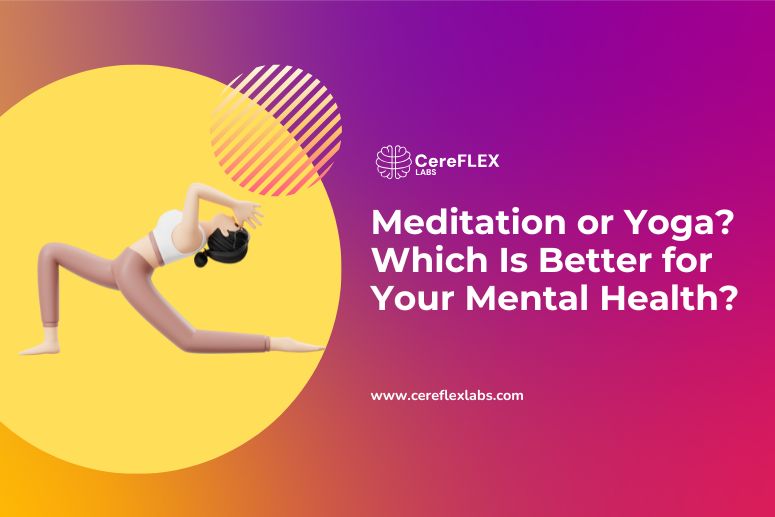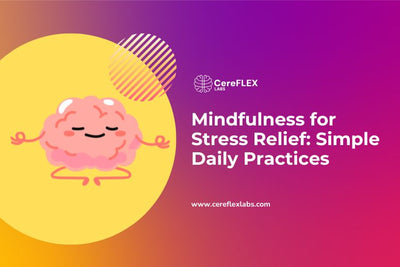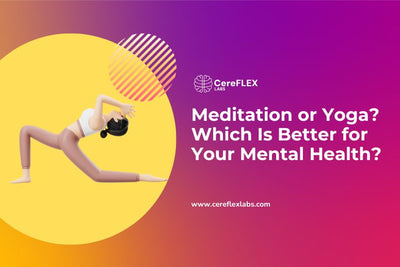Meditation and yoga are two of the most accessible, evidence-backed ways to improve your mental well-being. Both practices reduce stress, support focus, and promote emotional balance, but they do so in different ways.
Meditation cultivates stillness and inner awareness. It trains the brain to stay present, calm, and less reactive. Yoga combines breath with physical movement, calming the nervous system while reconnecting the mind and body.
Each has its own strengths. Choosing the right one depends on your goals—whether that’s improving attention, easing anxiety, or simply finding more clarity in your day.
If you’re unsure which to start with, exploring how each supports mental health can help you decide. And if you’re open to both, combining them may offer even greater benefits.
Here is the Quick Answer |
|
Yoga and meditation both support brain health, reduce stress, and improve emotional balance, but in different ways. Meditation focuses the mind and enhances cognitive clarity, while yoga combines movement and breath to regulate the nervous system. Blending both offers the best of each. For added mental support, Cereflex Labs’ AM/PM Protocol provides daily cognitive nourishment to keep you sharp and grounded. |
Meditation: How a Simple Practice Rewires Your Mind

Meditation is the practice of training your attention and awareness. It helps calm the mind, reduce stress, and create space between thoughts and reactions. Though its roots span thousands of years, modern research is only beginning to uncover the depth of its mental health benefits.
On the outside, meditation may look simple—just sitting, breathing, or focusing on a mantra. But inside the brain, meaningful changes are taking place. Neuroimaging studies show that consistent practice can reshape areas linked to attention, emotional regulation, and memory.
Regular meditation has also been associated with increased grey matter density and stronger neural connections, especially in the prefrontal cortex and hippocampus. These brain changes help support calm, focus, and resilience in everyday life.
Types of Meditation and Their Mental Benefits
There’s no one-size-fits-all method. Meditation comes in many forms, each offering unique benefits for your mindset and brain function:
- Mindfulness meditation: Focuses on observing thoughts, feelings, or sensations without judgment.
- Body scan: Involves slow, focused attention on physical sensations throughout the body.
- Mantra meditation: Uses repeated words, phrases, or sounds to centre the mind.
- Loving-kindness (Metta) meditation: Focuses on cultivating compassion for self and others.
- Movement-based meditation: Includes mindful walking or breath-led movement.
- Visualization: Uses mental imagery to evoke calm, focus, or motivation.
- Contemplative meditation: Involves reflection on an idea, question, or belief.
Many people report benefits like reduced anxiety, sharper focus, better emotional regulation, and improved sleep quality. Research supports these outcomes, and suggests that regular meditation can contribute to long-term mental and even physical health.
Tip: Pairing meditation with natural nootropics for clarity and focus can help deepen your practice and enhance cognitive calm.
Yoga: Movement, Breath, and Mindfulness in Harmony

Yoga is more than just stretching or improving flexibility. It’s a holistic practice that unites body, breath, and mind. While many turn to yoga for physical benefits, its impact on mental health is just as profound.
Rooted in ancient India, yoga combines asana (physical postures), pranayama (breath control), and dhyana (meditation) to promote internal balance. Historically, it was a spiritual discipline aimed at uniting the self with higher awareness. The word yoga comes from the Sanskrit yuj, meaning “to join” or “unite.”
Over thousands of years, yoga evolved through texts like the Rigveda and teachings such as Patanjali’s Yoga Sutras, which outlined the eight limbs of yoga, covering everything from ethical behaviour to meditative absorption. In traditional practice, yoga is also used to balance energy centres known as chakras, believed to influence physical and emotional well-being.
In modern times, yoga is widely recognized as a mind-body practice that supports emotional regulation, stress relief, focus, and mental clarity. Scientific studies increasingly show its effectiveness as a complementary mental health tool.
Types of Yoga and Their Mental Benefits
Just like meditation, yoga comes in many forms, each offering distinct pathways to improved mental well-being. From calming your nervous system to building emotional resilience, here are popular styles and what they offer the mind:
- Hatha yoga: A slower-paced practice focused on foundational postures and controlled breathing. It promotes relaxation, balance, and mental stillness. Ideal for beginners or stress relief.
- Vinyasa (flow) yoga: Links breath with movement in a continuous flow. Helps release anxious energy, improve focus, and increase present-moment awareness.
- Ashtanga yoga: A physically demanding and structured sequence. Builds mental discipline, enhances concentration, and supports emotional resilience through repetition.
- Kundalini yoga: Combines breath, movement, mantra, and meditation to activate inner energy. Often used to support emotional healing, intuition, and self-awareness.
- Yin yoga: Involves long-held, passive poses to release deep tension. Supports introspection, patience, and nervous system calm, especially helpful for managing chronic stress.
- Restorative yoga: Uses props to support the body in restful, gentle positions. Encourages deep relaxation, emotional release, and nervous system recovery, especially during burnout.
Each style can meet different needs depending on your mindset, energy, or stress level. Many people combine styles to support long-term mental clarity, flexibility, and emotional strength.
What does the research say?
Scientific studies continue to validate what ancient traditions have long suggested: both yoga and meditation have measurable benefits for mental health and cognitive function. While they work through different mechanisms, each practice contributes meaningfully to emotional balance, stress reduction, and brain performance.
Meditation: Research Insights
- A review of 45 studies found that meditation practices can lower physiological markers of stress, such as cortisol and blood pressure.1
- An 8-week mindfulness program significantly reduced anxiety in individuals with generalized anxiety disorder and improved their ability to manage stress.2
- A study of 153 adults using a meditation app over 2 weeks reported reduced loneliness and more meaningful social interactions.3
- In a cognitive task study, participants who listened to a brief meditation recording showed better attention and accuracy than non-meditators.4
- Early research suggests meditation may boost attention span, working memory, and processing speed in older adults.5
- A comparison of mindfulness meditation programs found improvements in sleep duration and quality, with fewer symptoms of insomnia.6
Yoga: Research Insights
- A study involving 12 sessions of hatha yoga over 4 weeks showed significant reductions in stress, anxiety, and depression—especially in women.7
- A review of 23 yoga interventions found significant improvements in depressive symptoms, supporting yoga as a viable complementary therapy for major depression.8
- Research also shows yoga can help improve sleep quality through both physical exertion and relaxation-focused breathing techniques.9
These findings show that both practices offer strong mental health benefits, with meditation more directly influencing attention, emotional regulation, and cognitive efficiency—while yoga offers a holistic, full-body approach that combines mindfulness with movement and breath.
Which is more beneficial for your mind?

Meditation and yoga both support mental well-being, just in different ways. The best choice depends on your goals, preferences, and how you connect with your body and mind.
If your main goal is to calm mental chatter, manage emotions, or improve focus, meditation may be the more direct option. It’s easy to start, doesn’t require any gear, and just a few minutes a day can reduce stress and improve clarity. Meditation trains the mind through stillness and observation, helping build emotional resilience over time.
If you prefer a more active and embodied experience, yoga offers a full-body path to mental wellness. The combination of movement, breath, and mindfulness helps release physical tension and regulate mood. Many people find it easier to reach a calm, focused state when their body is moving.
In truth, you don’t have to choose one over the other. Meditation deepens internal awareness, while yoga grounds that awareness in physical movement. Practicing both can offer a well-rounded approach to mental health, especially when combined with healthy lifestyle habits and nootropic support.
For example, nootropics for energy and focus can enhance mental clarity and attention during your yoga or meditation sessions. This pairing supports both the practice and the mindset you’re trying to build.
Start with what feels doable. Whether you sit in silence or flow through movement, consistency is what leads to long-term mental balance.
Conclusion
Whether you practise yoga, meditation, or both, prioritizing your mental well-being is one of the most valuable things you can do. These practices offer natural, accessible ways to reduce stress, sharpen focus, and build emotional resilience.
Meditation helps calm the mind, increase self-awareness, and strengthen your ability to respond rather than react. Yoga combines breath, movement, and mindfulness to regulate the nervous system and reconnect you with your body.
Together, they form a powerful foundation for mental clarity, calm, and inner strength.
To complement your practice, Cereflex Labs’ AM/PM Protocol is designed to support your brain from morning to night.
- The AM formula promotes alertness, focus, and cognitive energy—ideal for starting your day with mental clarity.
- The PM formula includes ingredients used to support relaxation, antioxidant protection, and overnight brain recovery.
This two-part supplement system fits seamlessly into your daily rhythm, offering all-day support for cognitive wellness—no matter if you’re meditating, flowing through yoga, or navigating daily life with more presence.






